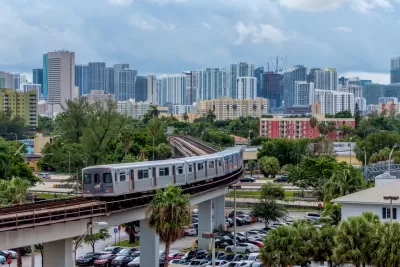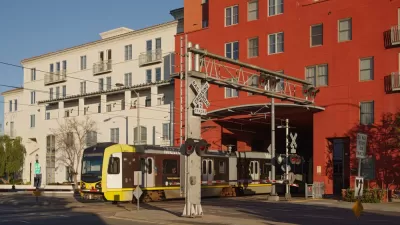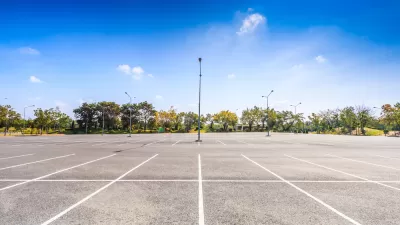No longer tied to minimum parking requirements, housing developers are starting to shift to more walkable, transit-oriented projects.

Developments designed to discourage private car ownership are being built in some traditionally car-oriented parts of the country, serving as potential models for future car-light development.
According to an article by Patrick Sisson in Bloomberg CityLab, “A confluence of trends has made such projects both more financially viable and marketable — especially in the South and Sun Belt, where zoning rules are often more permissive but car dependency and the urge to sprawl can be just as powerful.”
With parking spots costing tens of thousands of dollars apiece to build, developers are finding it more attractive to build communities without sprawling parking lots. “The Terner Center for Housing Innovation at the University of California at Berkeley estimated that parking adds up to $36,000 per unit of new housing built in the state.”
Sisson describes developments in Charlotte, Tempe, and Houston that are drastically reducing parking and creating walkable and transit-oriented spaces. A proposed 17-acre development in east Houston by Concept Neighborhoods with little on-site only became possible after the city relaxed parking requirements in some parts of town, letting developers decide how much parking to build. In Miami, a new high-rise development next to the Douglas Road Metrorail station touts public amenities and ground-floor retail.
FULL STORY: Car-Free Living Takes Off in Car-Centric Cities

Planetizen Federal Action Tracker
A weekly monitor of how Trump’s orders and actions are impacting planners and planning in America.

Congressman Proposes Bill to Rename DC Metro “Trump Train”
The Make Autorail Great Again Act would withhold federal funding to the system until the Washington Metropolitan Area Transit Authority (WMATA), rebrands as the Washington Metropolitan Authority for Greater Access (WMAGA).

DARTSpace Platform Streamlines Dallas TOD Application Process
The Dallas transit agency hopes a shorter permitting timeline will boost transit-oriented development around rail stations.

Renters Now Outnumber Homeowners in Over 200 US Suburbs
High housing costs in city centers and the new-found flexibility offered by remote work are pushing more renters to suburban areas.

The Tiny, Adorable $7,000 Car Turning Japan Onto EVs
The single seat Mibot charges from a regular plug as quickly as an iPad, and is about half the price of an average EV.

Supreme Court Ruling in Pipeline Case Guts Federal Environmental Law
The decision limits the scope of a federal law that mandates extensive environmental impact reviews of energy, infrastructure, and transportation projects.
Urban Design for Planners 1: Software Tools
This six-course series explores essential urban design concepts using open source software and equips planners with the tools they need to participate fully in the urban design process.
Planning for Universal Design
Learn the tools for implementing Universal Design in planning regulations.
Municipality of Princeton
Roanoke Valley-Alleghany Regional Commission
City of Mt Shasta
City of Camden Redevelopment Agency
City of Astoria
Transportation Research & Education Center (TREC) at Portland State University
US High Speed Rail Association
City of Camden Redevelopment Agency
Municipality of Princeton (NJ)





























